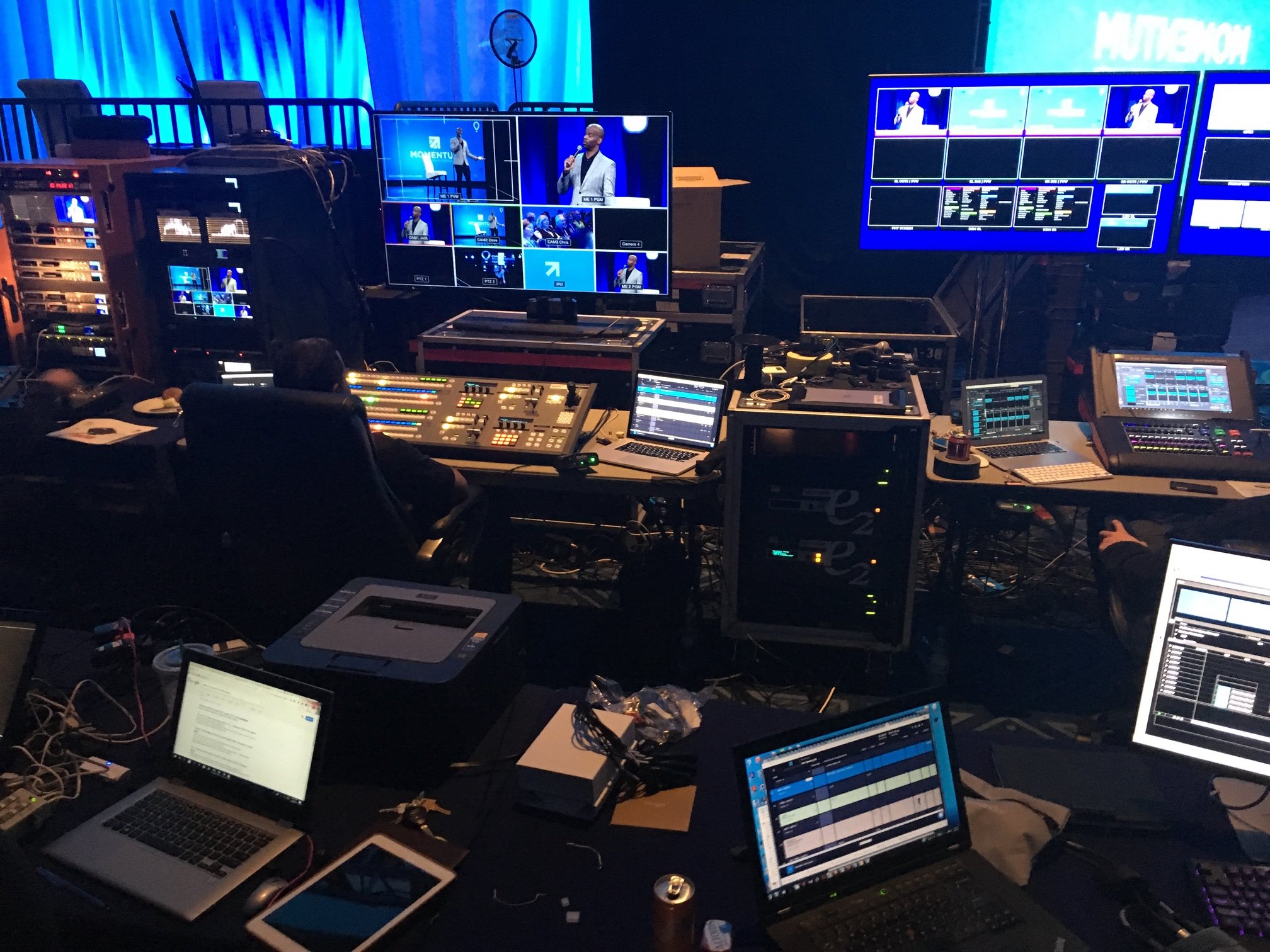Exactly How Event Production Functions: A Comprehensive Take A Look At the Process
Event production is a complicated and structured process that requires careful planning and implementation. It starts with establishing clear objectives and understanding the target market. Each action, from budgeting to location choice, plays an essential duty in making certain success. As the process unravels, numerous aspects need to line up effortlessly. Yet, the nuances of this elaborate operation typically go unnoticed. What are the crucial phases that add to a memorable event?

The Initial Drawing Board
When beginning on event production, mindful preparation is necessary to ensure an effective outcome. The preliminary drawing board acts as the structure for all succeeding initiatives. Throughout this stage, event producers need to specify the event's objective and purposes plainly. Recognizing the target market aids customize the experience and messaging, assuring relevance and engagement.Producers should likewise think about the event style, whether it be in-person, virtual, or hybrid, as this will affect numerous logistical elements. Selecting a suitable date and place is vital, as it impacts accessibility and availability.Furthermore, setting up a reliable team is basic for splitting duties and improving interaction. Developing a timeline with milestones warranties all jobs are completed on schedule. This phase includes thorough research study, consisting of recognizing potential obstacles and creating techniques to mitigate threats. Inevitably, a well-structured preliminary planning phase sets the tone for an effective event production trip.

Budgeting and Resource Allocation
In event production, reliable budgeting and resource appropriation are crucial for success - event production charlotte. Establishing monetary parameters establishes the foundation for all succeeding choices, while resource circulation techniques ensure that every part of the event is effectively supported. With each other, these elements assist keep control over expenditures and maximize the use of available resources
Developing Financial Parameters
Establishing monetary criteria is important to the success of any kind of event production, as it sets the foundation for effective budgeting and source appropriation. This process starts with specifying the overall budget plan, which incorporates all aspects of the event, including venue expenses, catering, and advertising. By recognizing available funds, event coordinators can focus on expenditures and designate resources appropriately. Furthermore, it is vital to perform extensive marketing research to anticipate prospective prices and recognize financing resources, such as sponsorships or ticket sales. Establishing clear financial parameters likewise help in danger management, enabling coordinators to allot backup funds for unanticipated expenditures. Inevitably, a distinct budget acts as a roadmap, assisting the event production team towards accomplishing their goals while preserving monetary control.
Resource Distribution Methods
Reliable source circulation methods are crucial for making best use of the influence of an occasion while adhering to budget plan restraints. Effective event production calls for a careful technique to budgeting and resource allotment. Planners must focus on important elements such as venue, catering, and technology, making certain that funds are alloted to locations that enhance attendee experience. A thorough budget ought to outline anticipated costs and identify locations for prospective cost financial savings, such as discussing with suppliers or checking out sponsorship opportunities. In addition, tracking expenditures throughout the planning process aids stop overspending. By using critical resource circulation, event producers can deliver an unforgettable experience while preserving monetary duty, ultimately adding to the total success of the event.
Venue Choice and Logistics
Picking the right venue is vital to the success of any type of event, as it establishes the stage for the total experience. Venue choice involves examining numerous aspects, including capability, accessibility, and place. Organizers should take into consideration the target audience and the nature of the event, making sure the place straightens with the event's goals.Logistics play a considerable role in this process, entailing arrangements for seating, audiovisual devices, and providing solutions. A well-chosen location needs to promote smooth flow for participants and personnel, boosting engagement.Additionally, reviewing potential venues for amenities like auto parking, toilets, and fire escape is necessary for security and comfort. The timeline for protecting the place is also important, as preferred locations may book rapidly - event production charlotte. As a result, detailed planning and timely implementation can inevitably add to a smooth event experience, making place option and logistics basic parts of effective event production
Imaginative Principle Advancement
While the location sets the physical stage, creative principle growth shapes the event's identification and story. This procedure begins with determining the event's purpose and target audience, permitting event manufacturers to develop an engaging style that resonates with attendees. Conceptualizing sessions go to website often consist of varied perspectives, fostering cutting-edge concepts that line up with the event's goals.Once a style is established, aesthetic aspects such as color schemes, signs, and visite site design are designed to boost the total environment. Storytelling strategies may also be incorporated to create an engaging trip for participants, assuring an unforgettable experience. Additionally, factors to consider relating to enjoyment, activities, and interactive elements are aligned with the picked idea, enhancing the style throughout the event.Ultimately, effective innovative concept growth guarantees that every facet of the event works cohesively, leaving a long-term perception on participants and fulfilling the event's purposes. This foundational job prepares for succeeding planning and execution phases.
Collaborating With Vendors and Suppliers
Successful event production depends upon effective cooperation with vendors and vendors. Picking reputable companions, negotiating agreements effectively, and making sure prompt deliveries are important actions in this process. Each of these aspects adds greatly to the general success and smooth implementation of an occasion.
Selecting Reliable Partners
Just how can event organizers guarantee a seamless production experience? Choosing trusted companions is vital in attaining this objective. Event planners should carry out detailed research to identify vendors and providers with a tried and tested record of excellence. This consists of examining references, reviewing portfolios, and assessing client comments. Organizers need to focus on companions that show professionalism and reliability, timely communication, and a determination to collaborate. Building strong partnerships promotes trust and makes it possible for fast analytic during the event. Furthermore, it is helpful to select regional vendors who understand the place and local logistics. Eventually, an effective event rests on the harmony between coordinators and their partners, ensuring that every facet of production runs efficiently and effectively.
Working Out Agreements Successfully
Efficient negotiation of contracts is an essential action in the partnership between event organizers and their suppliers and vendors. This process involves clear interaction of expectations, deliverables, and timelines. Planners need to carry out extensive research on market prices and market standards to develop a baseline for negotiations. It is necessary to produce a collaborative ambience, motivating open discussion regarding terms, pricing, and possible contingencies. Organizers ought to additionally focus on understanding the supplier's capabilities and restrictions to align their requirements effectively. Adaptability can lead to equally advantageous arrangements, fostering lasting relationships. Crafting distinct agreements that include certain performance metrics can assist assure responsibility, ultimately resulting in effective event implementation and complete satisfaction for all events involved.
Making Sure Prompt Distributions
Timely shipments are essential for the smooth execution of any kind of event, calling for persistent partnership in between planners and their vendors and distributors. Effective communication is crucial, as it aids develop clear expectations concerning shipment timetables, amounts, and details demands. Coordinators usually create comprehensive timelines to describe important landmarks, ensuring all parties remain aligned throughout the process. Learn More Routine check-ins with vendors can assist determine prospective delays early, enabling for positive solutions. In addition, building strong connections with reputable vendors promotes depend on and responsibility, which can lead to much better service and prioritization. By prioritizing these collaborative efforts, planners can decrease disturbances, therefore boosting the general effectiveness of event production and guaranteeing that all required materials and solutions get here as intended.
Advertising and Promotion Strategies
While arranging an occasion, the success of marketing and promo methods can greatly affect participation and engagement. Reliable techniques often consist of a combination of electronic marketing, standard advertising, and grassroots outreach. Making use of social media systems permits real-time communication and targeted advertising, getting to specific demographics successfully. Email marketing projects can better engage possible attendees with individualized content and reminders.Collaborations with influencers or market leaders can additionally enhance integrity and widen reach. Producing interesting content, such as videos or blog sites, helps to produce buzz and receive interest leading up to the event. Furthermore, leveraging early-bird price cuts and unique benefits can incentivize ticket purchases.Promoting with conventional networks, such as posters or neighborhood media, remains relevant, particularly in community-focused occasions. A thorough method that incorporates several approaches warranties maximum exposure and interaction, inevitably adding to the event's success and the creation of a memorable experience for attendees.
On-Site Execution and Administration
On-site implementation and administration are essential components that identify the general success of an event. Efficient sychronisation throughout the event ensures that all aspects line up with the prepared schedule. Event supervisors look after logistics, including vendor sychronisation, equipment setup, and visitor solutions. Keeping track of timelines and dealing with any type of unforeseen issues are essential for maintaining a seamless experience.The team plays a substantial duty, as experienced employees are in charge of different tasks such as registration, information dissemination, and technological assistance. Communication among staff member is essential; it cultivates a joint setting and enables fast resolution of challenges.Additionally, safety and security protocols must be complied with, safeguarding the health of all attendees. Post-event examinations are likewise part of on-site management, providing insights for future renovations. By concentrating on these facets, event producers can create unforgettable experiences that meet or go beyond guest assumptions while accomplishing the event's objectives.
Regularly Asked Concerns
Just how Do I Choose the Right Event Theme?
Choosing the appropriate event style entails thinking about the target audience, event function, and venue. Looking into current trends and collecting input from stakeholders can also motivate creative ideas that resonate and develop a memorable experience.

What Prevail Errors in Event Production?
Common mistakes in event production frequently include poor preparation, bad communication among employee, budget mismanagement, disregarding to consider the target market's requirements, and stopping working to conduct an extensive post-event assessment for future improvements.
Just How Can I Gauge Event Success?
To determine event success, one can examine guest complete satisfaction, engagement degrees, budget plan adherence, and post-event feedback. Trick performance indicators, such as ticket sales and social media sites interactions, additionally supply important insights right into overall performance.
What Should I Do if It Moistens the Event Day?
In case of moisten the day, the organizer must execute backup plans, such as securing outdoors tents or moving tasks indoors. Interaction with attendees regarding changes is vital to ensure a smooth experience regardless of weather condition challenges.
Just How Can I Guarantee Participant Engagement During the Event?

Comments on “From weddings to conferences—why event production charlotte works for every type of event”